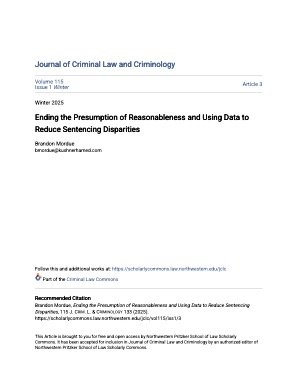By Brandon MordueFollow
The idea that one’s punishment should depend on the crime committed rather than which judge happens to do the sentencing strikes most as uncontroversial, if not a requirement for a fair sentencing regime. Forty years ago, the passage of the Sentencing Reform Act promised just that result. Increased data availability allows us to evaluate the project’s success. The results are not encouraging.
Federal defendants are sentenced using guidelines issued by the United States Sentencing Commission that sometimes bear little relation to the underlying wrongdoing. This has created a split among judges, with some following the guidelines and others rejecting them. The consequences are arbitrariness in sentencing and unwarranted disparities across offenders.
In 2007, the Supreme Court permitted appellate courts to presume the reasonableness of guideline sentences, largely insulating those sentences from judicial review. Much has changed since then, and it is time for the presumption to go. The findings of the original data analysis presented in this Article, as well as developments since the Court’s decision, show that the claims made in support of the presumption are unfounded. In fact, some of the related case law rests upon provably false empirical premises.
Today, most sentences are not within the range set by the guidelines. Favoring the minority of sentences that are within the range results in a sentencing regime incompatible with the overriding statutory aim of avoiding unwarranted sentencing disparities. Rather than presuming the reasonableness of within-guideline sentences, the courts can chart a course correction by prioritizing the data on actual sentences from the Sentencing Commission. Such a shift would achieve more consistent sentences across offenders convicted of similar crimes.
115 J. Crim. L. & Criminology 133 (2025), 73p.



